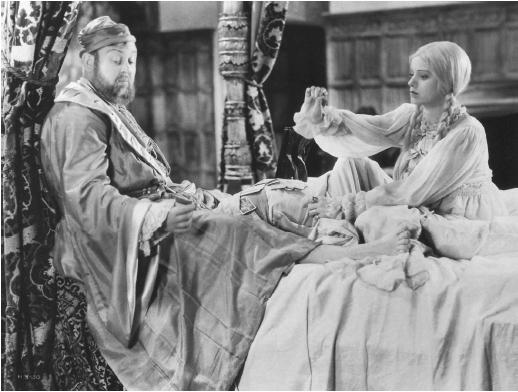The Private Life of Henry VIII (Dir: Alexander Korda, 1933)
There is no mystery to this film- it does exactly what it says on the tin, that is, recount the personal affairs of the great 16th Century English king, beginning on the day of his third wedding, and ending with the king in old age. Henry is that most famous of English kings; he of the six wives, father of the future Queen Elizabeth, and founder of the Church of England. He has been depicted on the big screen many times, but the definitive portrayal comes in this film, from Charles Laughton, who won the best actor Oscar for his performance. Boisterous and temperamental, stout of belly and assertive in gait, Laughton captures the essence of a man who history remembers as a formidable and highly-strung ruler.
 |
| Charles Laughton as King Henry VIII |
These early scenes also establish the tone of the film, which drifts seamlessly between comedy (thanks to Arthur Wimperis and Lajos Biro's witty script), and moments of surprising poignancy. Henry's life is beset by tragedies (many of them at his own 'hand', of course), and Korda does a very good job of giving weight to things like Anne's execution, and the death of Jane during childbirth, without compromising the general joviality of proceedings.
It isn't until wife number four shows up that things really kick into high gear though. The real-life wife of Laughton, Elsa Lanchester is an English actress best remembered now as the streaky-haired Bride of Frankenstein in the 1935 classic film of the same name ("she's alive, ALIVE!"). She shows up here as the young German duchess, Anne of Cleves, who is recommended as a wife to Henry by Thomas Cromwell. The film's version of events remains somewhat true to accepted fact- an artist was sent to Germany to paint a portrait of Anne for the king, but it is suspected that he exaggerated her good looks, and when the king got a look at her in person, he found her not to be all that he had been led to believe. False advertising in its earliest stages.
History tells us that Henry kissed Anne on the forehead on their wedding night, before returning to his own quarters, thus never consummating the marriage, and that Anne, being an intelligent woman, knew not to stand in the way of an annulment. The film's version of events is far more entertaining, as Lanchester, gurning it up for maximum comedic effect, tricks Henry into the annulment, and into giving her land and her choice of his men-of-court (in this version of events, Anne has began an affair with the man who traveled to Germany to tell her of the king's proposal), by fleecing him in a game of cards.
 |
| Aces high: Lanchester and Laughton |
After the revelation of Catherine's affair, we jump forward a year, to find the king alone and dispirited. Here he is paid a visit by Anne of Cleves, who recommends that he marry for a sixth time, this time to an older, less-capricious woman. And so, we jump forward several more years to find an aging Henry married to Catherine Parr, who nags at him to eat better, and to cover himself with a blanket to keep warm. Parr has no charms to speak of, but ultimately is exactly the kind of woman that the king needs. "Six wives, and the best of them's the worst", as Henry puts it.
As an account of Henry's personal life, this film is far from extensive, but it does take a very simple joy in the time period and the characters. As well as focusing on the king and his wives, the film also strives to give us a sense of court life (a witch hides a charm under Henry's pillow on each of his wedding nights, insistent that it will provide for him a son; the palace's cooks gossip about the king's love-life). Laughton is never less than compelling in the title role, and is ably supported by a strong cast. This is a fun film, and there are plenty of worse ways to spend an hour and a half. 4 stars.
I'll be reviewing another new film in ATLI... #19. Until then, here's looking at you!
No comments:
Post a Comment